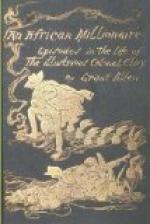The judge gazed at him severely. “Paul Finglemore,” he said, passing sentence in his sardonic way, “you have chosen to dedicate to the service of fraud abilities and attainments which, if turned from the outset into a legitimate channel, would no doubt have sufficed to secure you without excessive effort a subsistence one degree above starvation—possibly even, with good luck, a sordid and squalid competence. You have preferred to embark them on a lawless life of vice and crime—and I will not deny that you seem to have had a good run for your money. Society, however, whose mouthpiece I am, cannot allow you any longer to mock it with impunity. You have broken its laws openly, and you have been found out.” He assumed the tone of bland condescension which always heralds his severest moments. “I sentence you to Fourteen Years’ Imprisonment, with Hard Labour.”
The prisoner bowed, without losing his apparent composure. But his eyes strayed away again to the far end of the hall, where the two weeping women, with a sudden sharp cry, fell at once in a faint on one another’s shoulders, and were with difficulty removed from court by the ushers.
As we left the room, I heard but one comment all round, thus voiced by a school-boy: “I’d a jolly sight rather it had been old Vandrift. This Clay chap’s too clever by half to waste on a prison!”
But he went there, none the less—in that “cool sequestered vale of life” to recover equilibrium; though I myself half regretted it.
I will add but one more little parting episode.
When all was over, Charles rushed off to Cannes, to get away from the impertinent stare of London. Amelia and Isabel and I went with him. We were driving one afternoon on the hills beyond the town, among the myrtle and lentisk scrub, when we noticed in front of us a nice victoria, containing two ladies in very deep mourning. We followed it, unintentionally, as far as Le Grand Pin—that big pine tree that looks across the bay towards Antibes. There, the ladies descended and sat down on a knoll, gazing out disconsolately towards the sea and the islands. It was evident they were suffering very deep grief. Their faces were pale and their eyes bloodshot. “Poor things!” Amelia said. Then her tone altered suddenly.
“Why, good gracious,” she cried, “if it isn’t Césarine!”
So it was—with White Heather!
Charles got down and drew near them. “I beg your pardon,” he said, raising his hat, and addressing Madame Picardet: “I believe I have had the pleasure of meeting you. And since I have doubtless paid in the end for your victoria, may I venture to inquire for whom you are in mourning?”
White Heather drew back, sobbing; but Césarine turned to him, fiery red, with the mien of a lady. “For him!” she answered; “for Paul! for our king, whom you have imprisoned! As long as he remains there, we have both of us decided to wear mourning for ever!”




